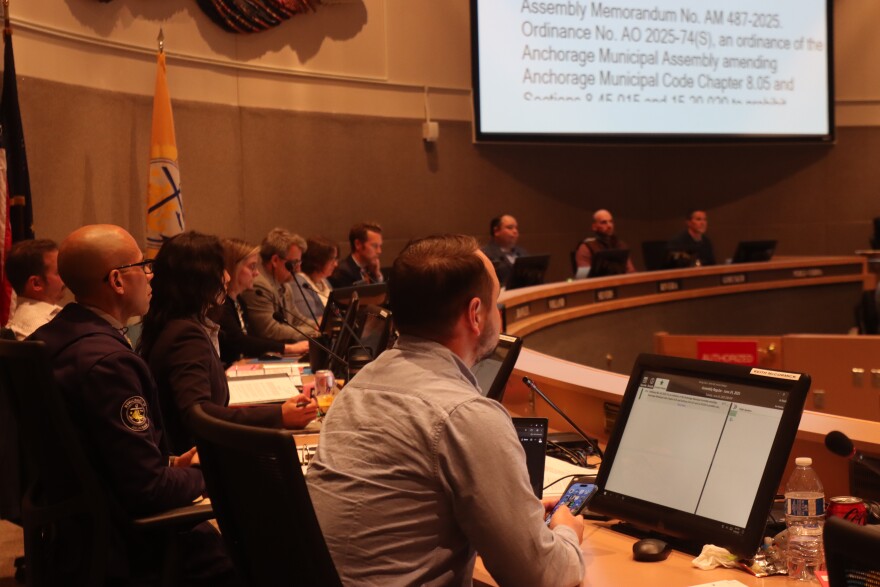A proposed ordinance to criminalize camping in Anchorage’s public spaces brought a huge crowd to the city’s Assembly meeting Tuesday.
South Anchorage Assembly member Keith McCormick’s ordinance – co-sponsored by Eagle River-Chugiak Assembly members Jared Goecker and Scott Myers – would make camping in a public area a class B misdemeanor, which carries a penalty of up to six months in prison and a $2,000 fine. It would replace the city’s current abatement process, during which large encampments are cleared after notices are posted and homeless residents are encouraged to head to shelter, while some set up camp elsewhere.
At the Assembly chambers Tuesday night, dozens of people lined the walls waiting to testify for more than three hours.
Emotions in the chamber ran high even before the ordinance came up. Anticipating a high level of participation, Assembly members voted to move testimony to the end of the meeting, to get through the rest of their business. That prompted a rebuke from McCormick.
“People are still showing up that want to speak on this, and you are attempting to silence them by pushing this until midnight. That is disrespectful to everyone in here,” McCormick said, prompting applause from the crowd. “I can’t believe you would try to push this away.”
“Mr. McCormick, you are out of order,” Assembly Chair Chris Constant said in response.

Of the more than 60 people who testified, opponents to the ordinance outnumbered supporters by a 2-to-1 margin.
Many who opposed the ordinance said it effectively criminalizes homelessness.
“Just as our homeless population is unable to pay rent, they will be unable to pay a $2,000 fine,” said Helen Malley, an attorney with the American Civil Liberties Union of Alaska. “Instead, these fines will simply impose another barrier on their ability to stabilize their lives.”
Others, like David Gober, questioned if the city had the resources to enforce the ordinance. Gober cited remarks from Anchorage Police Chief Sean Case, who recently said his department, as well as prosecutors, courts and jail facilities, are not equipped to enforce the ban.
“You people have enough knowledge here, you can write a better law than this,” Gober told the Assembly members. “Because this right here is really going to overtax his department to the max, and you're not going to be able to fund them.”
The ordinance’s supporters described the city’s homelessness crisis as a public safety issue, with stories of people defecating in public, openly using drugs, harassing business customers and trashing green spaces.
“This is about protecting ourselves from fire risk, drug risk, criminal activity, safety for our children,” said Gerard Farkas. “It gives the police a way to protect the people that pay your salaries, that build this city.”
Anchorage Mayor Suzanne LaFrance introduced a narrower ordinance that would prohibit camping near certain public spaces, including on sidewalks and roads, within 500 feet of a playground and within 200 feet of a trail. It would also prohibit unauthorized construction on public land of “hard-walled, hard-roofed, or hard-floored” structures, or any other construction aimed at facilitating camping.
“We need to be able to move much more quickly than our current code allows,” LaFrance said. “We must be able to root out encampments in these areas before public safety hazards arise.”
LaFrance’s version of the ordinance contains substantial changes and was only introduced Tuesday, so the earliest the Assembly could vote on it is seven days later.
The Assembly will hold a special meeting July 11 where members of the public can continue to testify on either proposal, provided they didn’t already testify Tuesday night.
Assembly Chair Chris Constant said he anticipates the body voting on one of the versions of the ordinance at that meeting.


